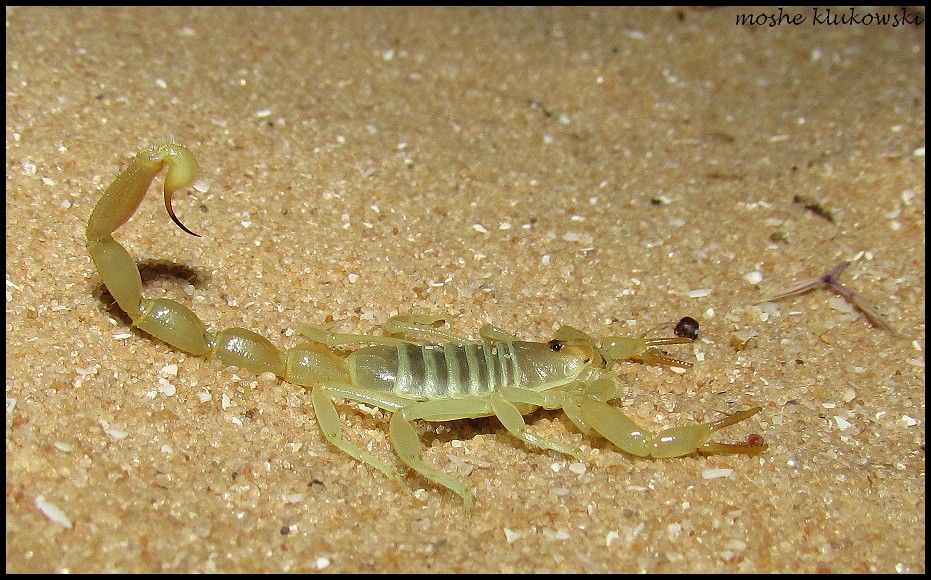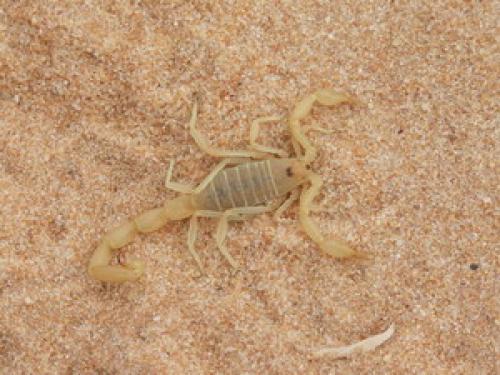The Egyptian Scorpion, or Leiurus quinquestriatus, is one of the most dangerous Scorpions in the world. Its poison contains a powerful neurotoxinthis can cause severe damage to the human nervous system, and in some cases, even death. Because of this, it has gained a huge reputation among the inhabitants of the desert regions.
Despite its danger, this scorpion subject of active scientific researchbecause its venom contains components that can be used in medicine.
In this article, we will look at biology, behavior, habitat, venom features, breeding process, and threats affecting the survival of this species.

Scientific classification
🔬 Classification of the Egyptian Scorpion:
✔ The Kingdom: Animals (Animalia)
✔ Type: Arthropods (Arthropoda)
✔ Class: Arachnids (Arachnida)
✔ Row: Scorpios (Scorpiones)
✔ Family: Buthidae
✔ Gender: Leiurus
✔ View: Leiurus quinquestriatus
📌 Interesting!
• Name Leiurus translated from Greek, it means "smooth tail", and quinquestriatus - "five-lane", describing the characteristic pattern on the body of a Scorpion.
* Due to the high level of toxicity of the poison, it is often referred to as "The Deadly Scorpion”.
Appearance and dimensions
💠 Main Features:
• Length: 8-11 cm.
• Weight: 2-3 g (relatively light).
• Color scheme: yellow or light brown, which helps to hide in the sand.
• Body: elegant, with long legs.
• Tail: it is thin and long, consists of five segments and ends with a venomous sting.
📌 Interesting!
Under ultraviolet light Leiurus quinquestriatus lights up bright green or blue.
Anatomy and Physiology
🦴 Chitinous cover
* Protects the Scorpion from drying out and predators.
🦷 Oral apparatus
* Uses pincers to hold down prey.
☠ Poison
* Highly toxic, contains neurotoxins, cardiotoxins, and cytotoxins.
* Affects the nervous system, causing severe pain, seizures, paralysis, and heart failure.
📌 Interesting!
Poison Leiurus quinquestriatus It is researched by scientists because it contains chlorotoxinwhich may help in the treatment of brain cancer.

Habitat and distribution
🌍 Where does the Egyptian Scorpion live?
* Deserts and semi-deserts of North Africa and the Middle East.
* Main countries: Egypt, Libya, Algeria, Sudan, Israel, Jordan, Saudi Arabia, Iran.
* Prefers sandy and stony soils.
📌 Interesting!
The Egyptian Scorpion doesn't dig holes, and hides under rocks or in cracks.
Food and hunting
🍽 What does an Egyptian Scorpion eat?
• Insects (crickets, cockroaches, beetles).
• Arachnids (spiders, other scorpions).
• Small vertebrates (lizards, young rodents).
💡 How does he hunt?
* Uses sensitive hairs on your feet to detect vibrations from prey.
* The pincers are weak, so to kill the victim always uses poison.
📌 Interesting!
Unlike the Imperial Scorpion, this species relies on not on a claw, but on a fast-acting poison.
Behavior and social structure
🦎 Activity
* Leads night life.
🧍 Single Character
* Aggressive, does not tolerate neighbors.
📌 Interesting!
In case of danger, quickly runs away or attacks the enemy.
Reproduction and development
❤️ How does the Egyptian Scorpion breed?
* The male performs mating dance.
* Pregnancy continues 2-4 months.
* Born 10 to 30 cubswhich remain on the mother's back until the first molt.
📌 Interesting!
The pups are white and transparent, and darken after molting.
Poison and its effect on humans
⚠ Bite Symptoms:
✔ Acute pain.
✔ Cramps.
✔ Rapid heartbeat.
✔ In severe cases-paralysis of the respiratory muscles.
💉 First aid for a bite:
* Don't panic!
* Restrict movement of the bitten limb.
* Seek medical attention immediately.
📌 Interesting!
The bites are deadly mainly for children, the elderly, and people with heart disease.

Threats and species protection
⚠ Main threats:
Loss of the natural environment due to urbanisation.
✔ Mass trapping to study the poison.
🌍 Security measures:
* Control over trapping.
* Study of the ecological role of the species.
📌 Interesting!
Through high adaptability the Egyptian Scorpion it is not under threat of extinction.
Conclusion
The Egyptian Scorpion (Leiurus quinquestriatus) is the real lord of the deserts, which combines a formidable species, dangerous venom, and unique biological features.
It plays an important role in nature as insect population regulator and is an object medical research.
🛑 Its bites are deadly, so when meeting this Scorpion, you should be as careful as possible!
